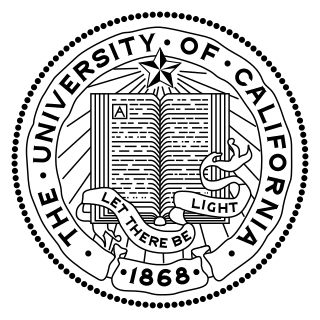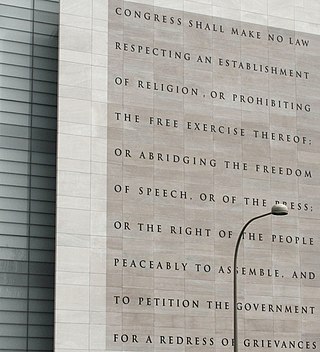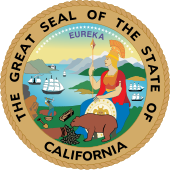
The First Amendment to the United States Constitution prevents the government from making laws respecting an establishment of religion; prohibiting the free exercise of religion; or abridging the freedom of speech, the freedom of the press, the freedom of assembly, or the right to petition the government for redress of grievances. It was adopted on December 15, 1791, as one of the ten amendments that constitute the Bill of Rights. In the original draft of the Bill of Rights, what is now the First Amendment occupied third place. The first two articles did not pass, so the article on disestablishment and free speech ended up being first.

The University of California (UC) is a public land-grant research university system in the U.S. state of California. Headquartered in Oakland, the system is composed of its ten campuses at Berkeley, Davis, Irvine, Los Angeles, Merced, Riverside, San Diego, San Francisco, Santa Barbara, and Santa Cruz, along with numerous research centers and academic centers abroad. The system is the state's land-grant university.

The University of California, Berkeley is a public land-grant research university in Berkeley, California. Founded in 1868 and named after the Anglo-Irish philosopher George Berkeley, it is the state's first land-grant university and is the founding campus of the University of California system.

The California State University is a public university system in California, and the largest public university system in the United States. It consists of 23 campuses and seven off-campus centers, which together enroll 457,992 students and employ 56,256 faculty and staff members. In California, it is one of the three public higher education systems, along with the University of California and the California Community Colleges systems. The CSU system is officially incorporated as The Trustees of the California State University, and is headquartered in Long Beach, California.

The Foundation for Individual Rights and Expression (FIRE), formerly called the Foundation for Individual Rights in Education, is a 501(c)(3) non-profit civil liberties group founded in 1999 with the mission of protecting freedom of speech on college campuses in the United States. FIRE changed its name in June 2022, when it broadened its focus from colleges to freedom of speech throughout American society.
Academic freedom is the right of a teacher to instruct and the right of a student to learn in an academic setting unhampered by outside interference. It may also include the right of academics to engage in social and political criticism.

In the United States, freedom of speech and expression is strongly protected from government restrictions by the First Amendment to the U.S. Constitution, many state constitutions, and state and federal laws. Freedom of speech, also called free speech, means the free and public expression of opinions without censorship, interference and restraint by the government The term "freedom of speech" embedded in the First Amendment encompasses the decision what to say as well as what not to say. The Supreme Court of the United States has recognized several categories of speech that are given lesser or no protection by the First Amendment and has recognized that governments may enact reasonable time, place, or manner restrictions on speech. The First Amendment's constitutional right of free speech, which is applicable to state and local governments under the incorporation doctrine, prevents only government restrictions on speech, not restrictions imposed by private individuals or businesses unless they are acting on behalf of the government. The right of free speech can, however, be lawfully restricted by time, place and manner in limited circumstances. Some laws may restrict the ability of private businesses and individuals from restricting the speech of others, such as employment laws that restrict employers' ability to prevent employees from disclosing their salary to coworkers or attempting to organize a labor union.

Proposition 209 is a California ballot proposition which, upon approval in November 1996, amended the state constitution to prohibit state governmental institutions from considering race, sex, or ethnicity, specifically in the areas of public employment, public contracting, and public education. Modeled on the Civil Rights Act of 1964, the California Civil Rights Initiative was authored by two California academics, Glynn Custred and Tom Wood. It was the first electoral test of affirmative action policies in North America. It passed with 55% in favor to 45% opposed, thereby banning affirmative action in the state's public sector.

Erwin Chemerinsky is an American legal scholar known for his studies of constitutional law and federal civil procedure. Since 2017, Chemerinsky has been the dean of the UC Berkeley School of Law. Previously, he was the inaugural dean of the University of California, Irvine School of Law from 2008 to 2017.

The Constitution of California is the primary organizing law for the U.S. state of California, describing the duties, powers, structures and functions of the government of California. California's constitution was drafted in both English and Spanish by American pioneers, European settlers, and Californios and adopted at the 1849 Constitutional Convention of Monterey, following the American Conquest of California and the Mexican–American War and in advance of California's Admission to the Union in 1850. The constitution was amended and ratified on 7 May 1879, following the Sacramento Convention of 1878–79.
A speech code is any rule or regulation that limits, restricts, or bans speech beyond the strict legal limitations upon freedom of speech or press found in the legal definitions of harassment, slander, libel, and fighting words. Such codes are common in the workplace, in universities, and in private organizations. The term may be applied to regulations that do not explicitly prohibit particular words or sentences. Speech codes are often applied for the purpose of suppressing hate speech or forms of social discourse thought to be disagreeable to the implementers.
Robert J. Corry, et al. v. The Leland Stanford Junior University, et al., No. 740309, was a case in which the Santa Clara County Superior Court ruled that Stanford University's speech code violated the freedom of speech rights of its students guaranteed under California's Leonard Law.
Pruneyard Shopping Center v. Robins, 447 U.S. 74 (1980), was a U.S. Supreme Court decision issued on June 9, 1980 which affirmed the decision of the California Supreme Court in a case that arose out of a free speech dispute between the Pruneyard Shopping Center in Campbell, California, and several local high school students.

Student governments in the United States exist in both secondary and higher education. At the collegiate level, the most common name is Student Government, according to the American Student Government Association's database of all student governments throughout the United States. The next most common name is the student government association. Other names are student senate, associated students, or less commonly students' union. There was one instance of a government of the student body, at Iowa State University. At Yale University, the undergraduate student government is known as the Yale College Council. High school student governments usually are known as Student Council.

California Education Code 48907 (1977), also known as the California Student Free Expression Law, acts as a counter to the Hazelwood v. Kuhlmeier (1988) Supreme Court ruling, which limited the freedom of speech granted to public high school newspapers. The Hazelwood v. Kuhlmeier decision held that public school curricular student newspapers that have not been established as "forums for student expression" are subject to a lower level of First Amendment protection than independent student expression or newspapers established as forums for student expression. Ed Code 48907 affirms the right of high school newspapers to publish whatever they choose, so long as the content isn't explicitly obscene, libelous, or slanderous, and doesn’t incite students to violate any laws or school regulations. The newspaper content must also pass the minimal disruption test set forth in the Supreme Court ruling on Tinker v. Des Moines (1969). In contrast with Hazelwood, which limited First Amendment protection to only those high school newspapers that had, through practice or policy, been established as forums for student expression, Ed Code 48907 affirms the right of all newspapers to the freedom of expression.
The history of the University of California, Berkeley, begins on October 13, 1849, with the adoption of the Constitution of California, which provided for the creation of a public university. On Charter Day, March 23, 1868, the signing of the Organic Act established the University of California, with the new institution inheriting the land and facilities of the private College of California and the federal funding eligibility of a public agricultural, mining, and mechanical arts college.

The California Public Records Act was a law passed by the California State Legislature and signed by governor Ronald Reagan in 1968 requiring inspection or disclosure of governmental records to the public upon request, unless exempted by law.

In the United States, campus carry refers to the possession of firearms on college or university campuses. Each state has its own discretion on laws concerning campus carry.
Hazelwood School District et al. v. Kuhlmeier et al., 484 U.S. 260 (1988), was a landmark decision by the Supreme Court of the United States which held, in a 5–3 decision, that student speech in a school-sponsored student newspaper at a public high school could be censored by school officials without a violation of First Amendment rights if the school's actions were "reasonably related" to a legitimate pedagogical concern.

Proposition 16 is a California ballot proposition that appeared on the November 3, 2020, general election ballot, asking California voters to amend the Constitution of California to repeal Proposition 209 (1996). Proposition 209 amended the state constitution to prohibit government institutions from considering race, sex, or ethnicity, specifically in the areas of public employment, public contracting, and public education. Therefore, Proposition 209 banned the use of race- and gender-based affirmative action in California's public sector and public university admissions.













